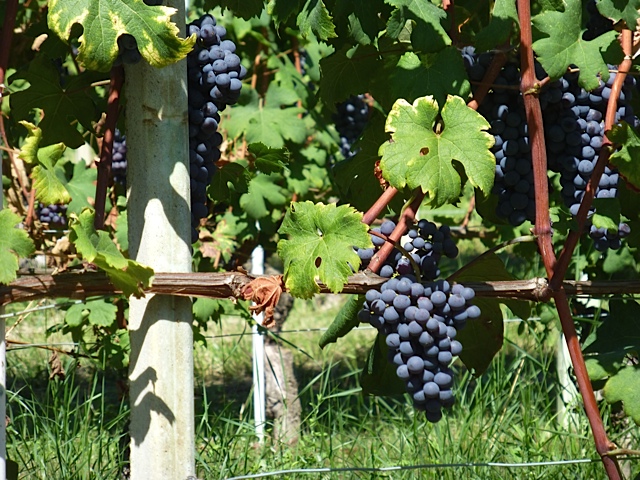August 22, 2016 • Life for Leaders
And no one pours new wine into old wineskins. Otherwise, the wine will burst the skins, and both the wine and the wineskins will be ruined. No, they pour new wine into new wineskins.
Mark 2:22
 In the second chapter of Mark’s gospel, some people asked Jesus why his disciples did not fast, as was common among the disciples of John the Baptist and the Pharisees (2:18). In part of his answer, Jesus used the analogy of wine and wineskins, pointing out that one does not put new wine into old wineskins.
In the second chapter of Mark’s gospel, some people asked Jesus why his disciples did not fast, as was common among the disciples of John the Baptist and the Pharisees (2:18). In part of his answer, Jesus used the analogy of wine and wineskins, pointing out that one does not put new wine into old wineskins.
Gracious God, give me confidence in you to be open to your new wine, no matter what this means for my life.
On a literal level, what Jesus said in Mark 2:22 would have been common knowledge. When people in his time wanted to make wine, they would put grape juice into a carefully prepared animal skin. Then, when the fermenting wine expanded, the skins would stretch. Old wineskins, however, would already have been stretched. Thus, if one tried to make wine in an old skin, it would burst and the wine would be lost.
Of course Jesus was not teaching a lesson in oenology (the study of wine-making, from the Greek word for wine, oinos). Rather, he was speaking about what it means to be open to the kingdom of God. The presence of the kingdom demands new expressions and new forms. The old ways and the old practices cannot accommodate the vitality of God’s reign.
This is just as true today as in the first century. If we are going to be truly open to God’s work in us, we must be prepared for something new, even for unexpected surprises. Too often, however, we cling to that which is familiar and comfortable, essentially rejecting the “new wine” of God’s kingdom.
Several years ago, when I was pastor of Irvine Presbyterian Church, I preached a sermon on wine and wineskins. I challenged my congregation to consider how easy it is for us to hang onto the old wineskins, thus having no room in our lives for the new wine of the kingdom. One week later, I was speaking to a church retreat at Laity Lodge. During this retreat, Laity’s director, Dave Williamson, asked me if I was ready to come join them on staff. Dave knew that I had brushed off a similar invitation several months earlier. But, as Dave spoke, I realized that I had a choice. Either I could take the advice I had so passionately given my congregation a week earlier and be open to the new wine of God, or I could say “no” and close myself to the new thing God might be doing in my life. So I told Dave that though I could not imagine ever moving to Texas, and though I was not looking for a new job, I knew I had to be open to the possibility of “new wineskins.” Thus began a conversation and process that led to my going to Laity Lodge as its senior director.
Now, as I’ve noted before in recent devotions, following Jesus faithfully doesn’t necessarily mean that we must change our jobs. Similarly, your openness to the new wine of the kingdom doesn’t mean you need to leave your current job. But, as we are open to the new thing God wants to do in us, we’ll find that every part of life is transformed by the good news of the kingdom of God.
May God give you the grace to be open to the new thing he wants to do in you today!
QUESTIONS TO CONSIDER:
How has the new wine of God made a difference in your life?
Are there old wineskins that you are clutching such that you are not open to the new wine of the kingdom of God?
Are you willing to trust God enough to be open to his new wine?
PRAYER:
Gracious God, you know how my soul is split when it comes to your new wine. Part of me yearns for the adventure of serving you in new ways, and the other part of me clings to what is old and familiar.
Give me confidence in you, Lord, to be open to your new wine, no matter what this means for my life. In trusting you, may I be unafraid of the new wineskins you have for me. May your new wine fill my life, transforming me and how I live in every part of life. Amen.
Explore more at the Theology of Work Project online Bible commentary: Jesus Calls People at Work (Luke 5:1-11; 27-32)

Dr. Mark D. Roberts is a Senior Strategist for Fuller’s Max De Pree Center for Leadership, where he focuses on the spiritual development and thriving of leaders. He is the principal writer of the daily devotional, Life for Leaders, and the founder of the De Pree Center’s Flourishing in the Third Third of Life Initiative. Previously, Mark was the Executive Director of the De Pree Center, the lead pastor of a church in Southern California, and the Senior Director of Laity Lodge in Texas. He has written eight books, dozens of articles, and over 2,500 devotions that help people discover the difference God makes in their daily life and leadership. With a Ph.D. in New Testament from Harvard, Mark teaches at Fuller Seminary, most recently in his D.Min. cohort on “Faith, Work, Economics, and Vocation.” Mark is married to Linda, a marriage and family counselor, spiritual director, and executive coach. Their two grown children are educators on the high school and college level.




